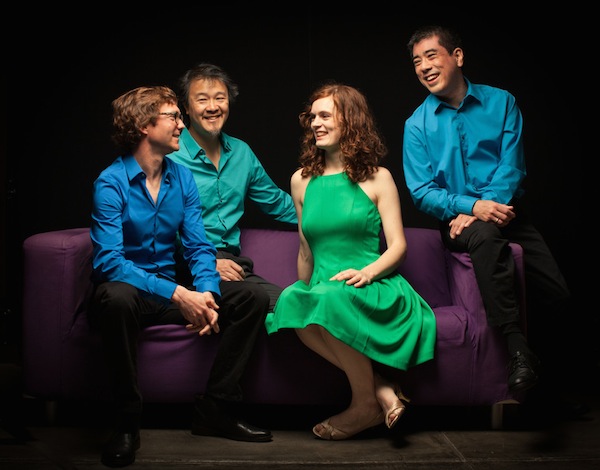Miller Theatre offers a portrait of Rzewski from teenager to today

The Del Sol String Quartet performed music of Fred Rzewski Thursday night at Miller Theatre. Photo: RJ Muna
Miller Theatre’s Composer Portrait series is invaluable because rather than presenting music from a collection of composers it strives to present a snapshot of one composer’s voice and career. There is no better way to introduce the curious listener to unfamiliar work.
Thursday night’s concert, the last in this year’s season, went against type—blame that on the thinking of the Del Sol String Quartet and the Portrait’s subject, Fred Rzewski. (This is his second Portrait at Miller; the first, in 2005, presented The People United Will Never Be Defeated! and Bring Them Home!, for two pianos and two percussionists.)
Rzewski’s career is too large and stylistically varied to pin down in one concert. Del Sol played the world premiere of his Words for string quartet on Thursday, and that music sounded like a further advance in his thinking. But the ensemble also dedicated half the program to the juvenilia of Rzewski’s 1955 String Quartet, written at age 17.
This didn’t paint an effective musical picture of the man, though it did offer valuable insight into his thinking and development. In his program note Rzewski was dismissive about the quartet, noting that he had barely looked at it since and had never heard it played. (Del Sol gave the belated premiere 18 months ago at the Library of Congress.) He also noted its uncharacteristic sentimental inspiration. “I do remember that at the time I fell immediately and desperately in love with every woman who crossed my path. So I can only assume that this music must have something to do with love, especially the unhappy sort.”
There was good material in the quartet and also bad. A passage of idiomatic string writing was frequently followed by an ungainly interval or music in a less-than-ideal register. What made the most sense, and was most satisfying, eschewed late Romanticism for a Copland-esque Americana–simple triads arrayed in an unobtrusively logical harmonic rhythm.
One can’t do better than Rzewski’s own critique of his quartet in the note: “There is undoubtedly some originality in the general conception; but at the same time there is clearly a lot of fakery as well. It is easy to spot places where the composer is pretending, simply borrowing clichés he has seen in this or that score by this or that composer, but doesn’t really know anything about it.” That is as good a description as one will find of someone who is writing music with talent but without understanding.
It also explains how Words was so transparent about Bartók’s influence and still sounded every bit like Rzewski.
During the on-stage conversation between Rzewski and Del Sol violist Charlton Lee—itself unusual because Rzewski asked most of the questions in a discussion centered on Ben Johnston’s tuning system—the one question Lee got off was about the composer’s “musical DNA”: what elements of the 1955 quartet might point toward the 2018 premiere? Rzewski’s response was “I don’t think I can answer that question. Maybe only a music critic can.”
Hearing Rzewski think about Bartók (along with some brief but notable memories of the Molto adagio-andante from Beethoven’s A minor Quartet, Op. 132) in both the past and present was one answer. And the contrast between the past and present showed Rzewski’s musical values in full light.
Words was in means more like Rzewski’s Coming Together than the recent, dense, quasi-romantic piano pieces, but it was very different in feeling and attitude. It was lean, like Haydn pared down to an absolute minimum of notes, and built on discrete blocks of musical ideas. In contrast to the 1955 work, it was absolutely idiomatic for the instrumentation, and where Del Sol could not really flatter the sound of the first piece, Words led to rhythmically and tonally precise, confident playing.
Spoken text is something Rzewski has been using well for decades, but rather than stimulate political thinking and passions, the words in Words were enigmatic, balancing the composer’s usual force with an odd irreverence straight out of Glenn Baxter.
In the first movement, marked “Unhurried,” Lee nearly shouted out lines like “Let music replace war,” and “how the mighty are fallen”—clear enough sentiments, but then there was also the confusing “how the poor are fallen.” The light-hearted final movement, “Con fuoco,” ended with Lee speaking: “Who knows? You can’t know everything, only what you need to know in order to survive. All the rest is…” The pat phrase led to a cadence at the double bar, but instead of one last tonic chord, cellist Kathryn Bates tipped a cow call over into the microphone. Fin.
One is tempted to ascribe the fascinating puzzle of Words to the technical skill and free thinking common in the late style of the great composers. It’s not an exaggeration to call Rzewski great–he has produced some of the finest music of the late 20th and early 21st centuries. And he has constantly shown in his work and comments, he is ever irreverent about the world around him and the classical tradition. That may be a long journey from the seriousness of youth, yet Rzewski keeps showing how essential it is.